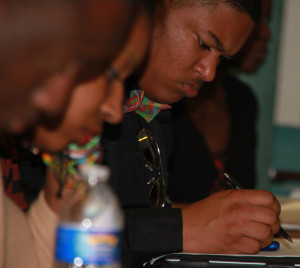College Admissions: Avoid the 7 Deadly Sins on Your Personal Essay By Alison Cooper Chisolm and Anna Ivey
We hope you enjoy this guest blog post.
College Admissions: Avoid the 7 Deadly Sins on Your Personal Essay
By Alison Cooper Chisolm and Anna Ivey,
Authors of How to Prepare a Standout College Application: Expert Advice that Takes You from LMO* (*Like Many Others) to Admit
 Working on your personal essay for the Common Application? Want to avoid the critical mistakes that too many applicants make? Then steer clear of what we call the 7 Deadly Sins!
Working on your personal essay for the Common Application? Want to avoid the critical mistakes that too many applicants make? Then steer clear of what we call the 7 Deadly Sins!
Sin #1. Your personal essay is not your work.
Your essay is expected to be your work, and if an admissions officer figures out that your essay is not your work, she will reject you. Don’t “hire out” your essay. Don’t copy or mimic a sample essay you find online (or in our book!). Don’t let a well-meaning editor (like your mom or dad) rewrite it or “tweak” it beyond all recognition. Write your personal essay yourself.
Sin #2. Your personal essay is not an essay.
Essays are specific forms of writing. You are asked to write an essay, so write an essay. Don’t write a poem. Don’t write a screenplay. Don’t write an academic treatise. Don’t write an autobiography. Write an essay.
Sin #3. Your personal essay is not personal.
Your personal essay is supposed to be PERSONAL. That means it should be about you, not about the person who influenced you, not about a political issue, not about a beautiful turn of phrase but about YOU.
Sin # 4. Your personal essay is not specific enough.
Your essay must be specific enough to be about you and only you. You are not the first, last, or only applicant who will write about your Mom or Dad when you pick the essay question asking you to write about a person who has had a significant influence on you. In fact, thousands of applicants will do just that every year. And that is perfectly fine, as long as your essay is distinctive enough that it wouldn’t work equally well for some other applicant.
Sin #5. Your personal essay is off-putting or worrisome.
Admissions officers read all components of an application with an eye for the applicant who is “off” in some way that could be threatening or disruptive in a college community. Diatribes don’t sit well with them, nor do personal essays that are just plain creepy (like an in-depth discussion of your fascination with serial murderers).
Sin #6. Your personal essay substantially exceeds the stated word limit.
If a word limit is given, you should adhere to it. It is disrespectful to simply ignore the directions you have been given. Regardless of how well written your 1,000 word essay is, if you were asked to write 500 words, you will be penalized for disrespecting those instructions. So follow the directions. Distill and clarify your thinking, and your writing, until your essay is within the word limits.
Sin #7. Your personal essay is not well written.
Misused words, grammatical errors, and typos are simply not acceptable. Your personal essay should be your best piece of writing ever. It should deserve an A++ from the most critical English teacher you have ever had (but make sure she understands that you’re not meant to be writing in term-paper language). Polish it until it becomes that A++ essay.
© 2013 Alison Cooper Chisolm and Anna Ivey, authors of How to Prepare a Standout College Application: Expert Advice that Takes You from LMO* (*Like Many Others) to Admit
Authors Bios
Alison Cooper Chisolm heads the college admissions consulting practice at Ivey College Consulting. She came to private consulting after working in admissions for more than 10 years at three selective universities (Southern Methodist University, University of Chicago, and Dartmouth College).
Anna Ivey is the former Dean of Admissions at the University of Chicago Law School and founded Ivey Consulting to help college, law school, and MBA applicants navigate the admissions process and make smart choices about higher education.
You can find more college admissions tips in the book How to Prepare a Standout College Application (Wiley, August 2013), and follow them on Twitter @IveyCollege and Facebook.



